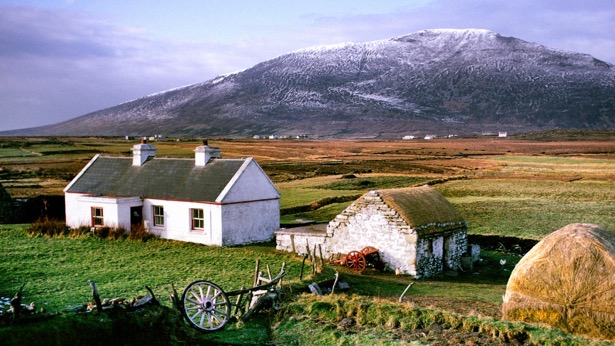Ireland and Dessert

Thomas Flanagan (1923-2002) was an American professor of literature who, in his fifties, turned his hand to writing novels, and wrote three of the finest historical novels I have ever read. Each of them is about Ireland, from which all four of Flanagan’s grandparents had emigrated in the nineteenth century, when poverty and famine and the hope for anything better led to a significant depopulation. (It’s surprisingly little known that the population of Ireland is significantly smaller even now than it was in the 1840s — a unique phenomenon.)
Flanagan’s first novel, The Year of French, which I read (and loved) soon after its appearance in 1979, concerns events chiefly in County Mayo in 1798.
The second, The Tenants of Time (1988), concerns events chiefly in West Cork during and after the Fenian Rising of 1867.
The third, which I have just now read, is called The End of the Hunt, and it concerns events chiefly, but by no means exclusively, in Dublin during the achievement of Irish independence in the years 1919-1922.
Each of the books is now published by New York Review Books, but the latter two, alas, only in electronic format — alas, because those folks publish consistently beautiful printed books, and I’d love to have the trilogy in uniform format, to contemplate as I look at my shelves.
The protagonists of Flanagan’s novels, and most of the major characters, are fictional, but he has a wonderful way of bringing in historical figures at unexpected times for brief appearances — occasionally more than brief. The one who plays the largest role is Michael Collins, in The End of the Hunt. We always see Collins through the eyes of other characters, which leaves a certain air of mystery about him, but then no one, it seems, ever really understood Collins fully. Here’s a moment that shows Flanagan’s marvelous eye and narrative economy. Collins has just entered a room and started emptying his pockets.
Collins sat down behind the desk, facing Lacy but as though oblivious of him. From the drawer of the desk, he took out a pad of yellow, blue-lined legal paper, and from his breast pocket a fountain pen, which he slowly unscrewed, with the care of a medical man attending to one of his instruments. The office was small and close. Behind Collins, the single window, dirt-smeared, looked out upon weedy back gardens, chimney pots. Collins placed the pen beside the pad of paper, and began, methodically, to go through the pile of scraps and envelopes he had taken from his pocket. On a few of them he scribbled notes, a few he read carefully and then crumpled and tossed into the metal basket beside the desk. Now he looked the industrious and promising postal clerk he had once been in London; his barony in West Cork had been oddly fecund in the production of clerks for Posts and Telegraphs; “God love him,” they would say of a newborn, “he has the look of a born sorter.” So had Collins now, a superior sorter, of proven intelligence, capable of making a few decisions as to the disposition of documents. And some of them, Lacy knew by experience, were indeed documents, written in farmer’s scrawl, schoolmaster’s neat copperplate, a few of them typed. These he placed together in a pile to one side. But some were letters requiring reply, and these he left till last, arranging them in the order he preferred, and then drawing to himself the pad and fountain pen. The slovenly litter he had spilled upon the desk had vanished.

STATUS BOARD
- Work: Making the transition from Augustine’s Confessions to Rousseau’s Confessions, which is ... quite a transition. Rousseau often boasted of how little he had read, but as one of his biographers says, "It would take a book to list all the books read by this man who despised books," and Rousseau is always responding, often quite slyly, to Augustine.
- Music: Nothing of note.
- Reading: See above!
- Food and Drink: I often praise my favorite local restaurant, Milo, and while my friend (and pastor) Aaron Zimmerman were having lunch there recently, the chef-owner Corey McIntyre brought out something he’s been working on: little balls of biscuit dough fried and dusted in cinnamon and sugar to make what I think of as Southern churros, dropped onto pastry cream and then covered with bourbon-marinated peaches and some orange zest. I nearly DIED of pleasure.
